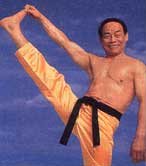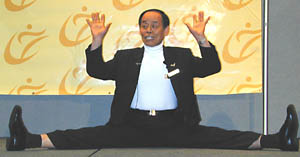|
|||
|
| -Countries |
| -Dictionary |
| -Federations |
| -M.A. Timeline |
| -Number System |
| -Styles |
| -Weapons |
| -Who's Who |
| -Updates |
| -Credits |
| -Stats |
| -Webmaster |
| Jhoon Rhee
Rhee, often referred to as the "Father of American Tae Twon Do," uses this story to illustrate a point about the present condition of the United States. In 1967 Rhee could forget his suitcase and still recover it intact. If he did the same thing today, he believes his luggage would be gone stolen by some hoodlum. An immigrant from South Korea who came to this country in 1957, Rhee is now a U.S. citizen, and proud of it. But he doesn't like the changes he has seen in the last 26 years. Moreover, he feels it's his duty as an American to do something to reverse the present trend. "Twenty-six years ago, America was literally
a paradise," says the 51-year-old Rhee. "Today, people
siphon the gas from my car in my own backyard. If America keeps
running this course for another 26 years, where will we be?"
"I really feel this is a good incentive for
them," notes Rhee. "I always tell my students: 'You
are black belts and you are 'A' students; you have a responsibility.
Use your might for right. You must use your skills to reverse
the peer pressure. Be role models for the rest of the students
in your school.'" Rhee tells the story of when he went to Tampa, Florida, to visit one of his schools. He told the students there that, if they were able to achieve straight "A's" in their schoolwork, he would take them all out to dinner. He returned six months later and the class had gone from three "A" students to eleven, and the majority had at least a "B" average. "That night I was on cloud nine," he says. "Just imagine if I could affect 1,000 studios across the country. If this is working in Florida and in Washington, D.C. (where Rhee's safety equipment has reduced injuries, made tournament competition more appealing, and lowered insurance rates for martial arts studios, to say nothing of how it's increased participation in the martial arts by the average individual.)
In 1973, Rhee attempted to start up what he called the World Black Belt League, city versus city martial arts competitions similar to those in professional football, baseball and basketball. The idea was to get the martial arts more into the public eye, and teams featuring the likes of Chuck Norris, Jeff Smith and John Natividad cropped up in Los Angeles, Cleveland, St. Louis, Washington, D.C. and elsewhere. The league was short-lived, however, soon folding due to financial reasons. One of Rhee's goals is to one day revive the World Black Belt League and feature competition in both fighting and martial ballet. Each participant would be required to compete in both events. "That way you have the masculine part of the martial arts and the beautiful part," Rhee explains. "To be a complete human being, you need that. Everything in the universe is both positive and negative and requires two parts. When you combine, you have completion." In 1975, Rhee sponsored a Republican versus Democrat tournament in which six politicians (three from each party) waged battle. "I wanted the whole world to know congressmen and senators were taking martial arts," he says. "To me, that elevated the image of martial arts tremendously." Rhee still personally instructs Washington politicians
twice a week. He also conducts monthly belt testing at each
of his eight schools in the Washington, D.C. area, and he still
trains daily 1000 push-ups, 120 kicks with each leg, and martial
ballet practice. He's in better shape than most men half his
age. Rhee has passed on his vast martial arts knowledge to not only politicians but to a number of other notables boxer Muhammad Ali, columnist Jack Anderson, and football coach George Allen, to name just a few. And, he has trained such great martial artists as Jeff Smith, John Chung, Gordon Franks, Pat and John Worley, Allen Steen, Larry Carnahan, and Charlie Lee. In 1976, the Washington Touchdown Club named Rhee the martial arts man of the century. It's not difficult to understand why. He has had a tremendous impact on the martial arts in this country over the years. No doubt he will continue to do so in the years to come. Naming Jhoon Rhee the BLACK BELT Man of the Year
seems the least one can do after all he has done to enhance
the quality of martial arts and enrich martial artists everywhere.
|

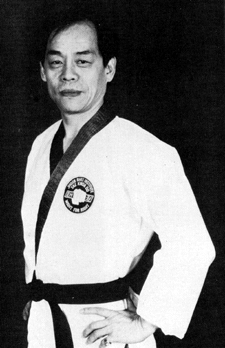
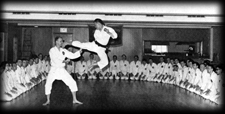
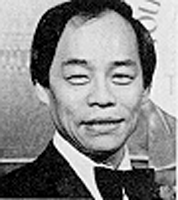 Rhee
is also one of the first to put tae kwon do forms to music,
introducing his "martial ballet" to the public in
1973 when he became a U.S. citizen. Martial ballet is a blend
of the martial arts of the East and classical music of the Westa
marriage of East and West, if you will. Rhee's students have
used this concept of musical martial arts forms to finish second
three straight years in the national TV Dance Fever competition.
Rhee
is also one of the first to put tae kwon do forms to music,
introducing his "martial ballet" to the public in
1973 when he became a U.S. citizen. Martial ballet is a blend
of the martial arts of the East and classical music of the Westa
marriage of East and West, if you will. Rhee's students have
used this concept of musical martial arts forms to finish second
three straight years in the national TV Dance Fever competition.
